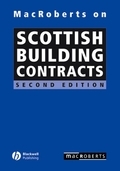
MacRoberts on Scottish building contracts
This book discusses the key provisions of the standard Scottish building contracts, against the background of Scots law. The new edition covers, in detail for the first time, Scottish adjudication, including a number of appeal cases,and covers other new case law and important new developments in novation. It is based on the 2005 revised Scottish JCT contracts. MacRoberts Construction Group is regarded as one of the foremost providersof construction and engineering legal services in the country, providing advice from contract formation and assembly to dispute handling and resolution. INDICE: Foreword by The Rt. Hon. Lord Hamilton. Preface. 1. Building Contracts in General. 1.1 Introduction. 1.2 Definition of a building contract. 1.3 Parties involved in a building project. 1.4 Types of building contract. 1.5 SBCC forms of building contract. 2. Procurement. 2.1 Introduction. 2.2 EU publicprocurement regime and EU economic and legal principles. 2.3 Beyond the EU. 2.4 Conditions for application of the procurement rules. 2.5 Who must comply with the Regulations. 2.6 Treatment of a proposed contract as a works contract, supply contract or a services contract. 2.7 What are the relevant financial thresholds. 2.8 Is there an applicable exclusion. 2.9 Types of procurement procedure. 2.10 The open procedure. 2.11 The restricted procedure. 2.12 The negotiated procedure with advertisement. 2.13 The competitive dialogue procedure. 2.14 Awarding the contract. 2.15 The Alcatel mandatory standstill period. 2.16 Remedies against contracting authorities (bidder grievances and complaints). 2.17 Awarding low-value contracts fairly. 3. Entering into a Building Contract. 3.1 Introduction. 3.2 Essentials of written and oral contracts. 3.3 Capacity tocontract. 3.4 Implied terms. 3.5 Letters of intent. 3.6 Incorporation of terms by reference to another document. 3.7 Signing a building contract. 4. Employers' Obligations. 4.1 Introduction. 4.2 Possession of the site. 4.3 Administration. 4.4 Information and instructions. 4.5 Variations. 4.6 Other obligations.5. Contractors' Obligations. 5.1 Introduction. 5.2 Completing the works. 5.3 Quality of the work. 5.4 Defective work. 5.5 Progress of the works. 5.6 Insurance and indemnity - the SBC provisions. 5.7 Joint Fire Code - the SBC provisions. 5.8 Health and Safety. 6. Time. 6.1 Introduction. 6.2 Commencement of the works. 6.3 Time of the essence. 6.4 Progress of the works. 6.5 Adjustment of completion date and extension of time for completion. 6.6 Partial possession and sectional completion. 6.7 Completion of the works. 6.8 Damages for late completion. 6.9 Liquidated damages.7 Certification. 7.1 Introduction. 7.2 Formal requirements of certificates. 7.3 Interim certificates. 7.4 Final certificates.7.5 Other certificates. 7.6 Roles and duties of certifiers. 8. Payment. 8.1 Contractual payment. 8.2 Adjustment of the contract price. 8.3 Loss and expense. 8.4 Quantum meruit. 8.5 Quantum lucratus. 8.6 Contractual retention. 9. Ending a Building Contract. 9.1 Introduction. 9.2 Frustration and impossibility. 9.3 Force majeure. 9.4 Termination. 9.5 Repudiation and rescission. 9.6 Death and illness. 9.7 Illegality. 9.8 Insolvency. 9.9 Prescription. 10. Remedies. 10.1 Introduction. 10.2 Rescission. 10.3 Specific implement. 10.4 Damages for breach of contract. 10.5 Finance charges. 10.6 Interest. 10.7 Interdict. 10.8 Withholding payment. 10.9 Suspending performance. 10.10 Delictual claims. 11. Sub-contractors and Suppliers. 11.1 Introduction. 11.2 Nominated and domestic sub-contractors. 11.3 Privity of contract. 11.4 Relationship between main and sub-contracts. 11.5 Main contractor's discount. 11.6 Suppliers. 11.7 Retention of title clauses. 11.8 Supply of goods by sub-contractors. 12. Assignation, Delegation and Novation. 12.1 Introduction. 12.2 Common law. 12.3 Effect of assignation upon claims. 12.4 Delectus personae. 12.5 Assignation under the SBC. 12.6 Delegation. 12.7 Novation. 13. Rights for Third Parties. 13.1 General. 13.2Collateral warranties. 13.3 Typical clauses. 13.4 Effects of the 1996 Act on collateral warranties. 13.5 Third party rights schedule. 13.6 Assignation. 14.Insurance, Guarantees and Bonds. 14.1 Insurance - general principles. 14.2 Insurance under the SBC. 14.3 Professional indemnity insurance. 14.4 Latent defects insurance. 14.5 Guarantees. 14.6 Bonds. 15. Dispute Resolution. 15.1 Introduction. 15.2 Litigation. 15.3 Mediation. 15.4 Expert determination. 15.5 Early neutral evaluation. 15.6 Dispute boards. 16. Adjudication. 16.1 Introduction. 16.2 The scope of Part II of the 1996 Act. 16.3 The notice of adjudication. 16.4 Appointment of the adjudicator. 16.5 The referral notice. 16.6 Conduct ofthe adjudication. 16.7 The decision. 16.8 Adjudicator’s fees and costs/expenses of the parties. 16.9 Liability of the adjudicator. 16.10 Enforcement proceedings. 16.11 Proceedings following adjudication. 16.12 Human rights. 16.13 Changes in the statutory framework. 17. Arbitration. 17.1 Introduction. 17.2 Arbitration proceedings. 17.3 Arbiter’s powers. 17.4 Termination of arbitration contracts and proceedings. 17.5 Decrees arbitral. 17.6 Awards of interest. 17.7 Awards of damages. 17.8 Awards of expenses. 17.9 The stated case. 17.10 Judicial review. 17.11 Reduction. 18. Tax. 18.1 Value Added Tax. 18.2 The Construction Industry Scheme. 19. Health and Safety. 19.1 Introduction. 19.2 Common law.19.3 Health and Safety at Work etc. Act 1974. 19.4 The Construction (Design and Management) Regulations 2007. 19.5 The SBC provisions. Table of Cases. Table of Statutes. Table of Statutory Instruments. Table of References to the JCT Standard Building Contract. With Quantities for use in Scotland SBC/Q/Scot (Revised May 2006 Edition). Index
- ISBN: 978-1-405-12973-2
- Editorial: Wiley-Blackwell
- Encuadernacion: Cartoné
- Páginas: 416
- Fecha Publicación: 28/07/2008
- Nº Volúmenes: 1
- Idioma: Inglés
